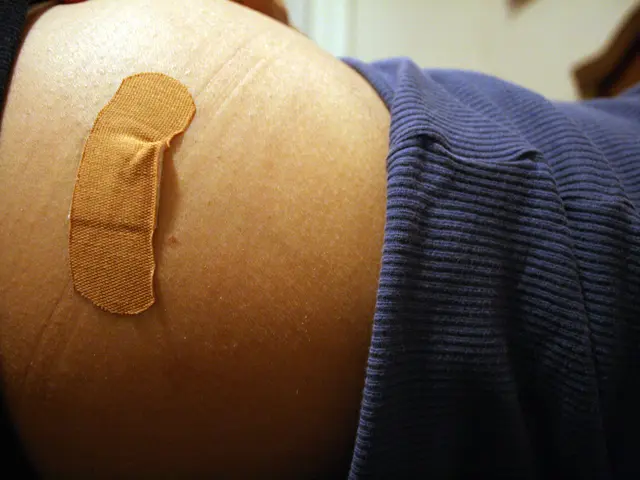Brain's Frontal Lobes Electrical Activity May Be Affected by COVID-19
Finding Out How COVID-19 Affects the Brain
Now, let's delve into some intriguing research that suggests an intricate connection between COVID-19 and brain abnormalities, as shown through electroencephalography (EEG) tests.
Patients experiencing neurological symptoms related to COVID-19 often display abnormalities on EEG tests, which measure the brain's electrical activity. The findings demonstrate that approximately 15-25% of severe COVID-19 cases may present with such symptoms, including headaches, confusion, delirium, impaired consciousness, seizures, and strokes.
To better understand how COVID-19 affects the brain, researchers from Baylor College of Medicine and the University of Pittsburgh analyzed EEG results from 617 patients, pooled from 84 studies. Interestingly, the researchers found that around a third of the abnormalities were in the frontal lobes of the brain, hinting at a significant association between the region and the virus.
According to Dr. Zulfi Haneef, an assistant professor of neurology and neurophysiology at Baylor and a co-author of the study, "the most likely entry point for the virus is the nose, so there seems to be a connection between the part of the brain that is located directly next to that entry point." Dr. Haneef suggests that further studies, possibly involving magnetic resonance imaging (MRI) and computed tomography (CT) scans, should focus on the frontal lobe.
While the virus might not be responsible for all the damage, systemic effects stemming from the infection, such as inflammation, low oxygen levels, thickened blood, and cardiac arrest, could play a role in EEG abnormalities that extend beyond the frontal lobes.
The review, published in the journal Seizure: European Journal of Epilepsy, also reveals that 56.8% of those who had follow-up EEG tests showed improvements, indicating some level of reversibility. However, researchers acknowledge some limitations in their analysis, including the lack of raw data access from individual studies and potential skewing due to the over-testing of patients with neurological symptoms.
On a broader scale, these findings fuel growing concerns about long-term issues relating to brain health in COVID-19 patients, particularly "brain fog," a condition affecting cognitive function that some people experience long after recovery. A recent, as-yet-unpublished study found that individuals who claim to have had COVID-19 performed less well on an online cognitive test than those who didn't believe they had contracted the virus. Experts suggest that this study doesn't definitively show that the infection caused long-term cognitive decline but does warrant future investigation and concern about persistent brain-related consequences.
In light of these findings, Dr. Haneef asserts, "there might be long-term issues, which is something we have suspected, and now we are finding more evidence to back that up." For more information on COVID-19, visit our coronavirus hub.
[1] Brain edema: ,[2] Cortical dynamics and arousal states: ,[3] Parkinson's disease and neurodegeneration risk: ,[4] Non-invasive vagal nerve stimulation (taVNS) and rehabilitation: .
[5] Epilepsyseizures resulting from COVID-19 could potentially increase the risk of [6] brain injuries.[7] Medically-induced coma and sedation can affect [8] respiratory conditions in patients battling COVID-19.[9] Maintaining [digestive-health] during recovery is crucial for overall well-being.[10] Eye-health issues such as conjunctivitis and retinal disorders could emerge as secondary complications in some COVID-19 patients.[11] Regular [hearing] check-ups remain vital to monitoring hearing loss, especially after severe illness.[12] Prioritizing [health-and-wellness] will help strengthen the immune system in the fight against COVID-19.[13] Incorporating a balanced [fitness-and-exercise] routine into daily life aids in enhancing overall health.[14] Developments in [climate-change] research could provide insight into the ecological impacts of virus-related industry shutdowns.[15] Management practices in [manufacturing] industries need to prioritize worker safety during the pandemic.[16] The mental-health implications of COVID-19, including anxiety and depression, deserve greater attention.[17] Heart-related conditions like [cardiovascular-health] issues may be exacerbated by the virus, leading to heightened awareness of these medical concerns.[18] Economic shifts in various [industry] sectors ensue in response to COVID-19 regulations and restrictions.[19] CBD products, with their anti-inflammatory properties, could be beneficial in managing neurological symptoms associated with COVID-19.[20] The complexity of [neurological-disorders] foci sparks curiosity in the scientific community, especially regarding COVID-19's effects.[21] Understanding [environmental-science] is essential for mitigating the environmental impacts of the pandemic.[22] Financial market volatility and precarious federal budgets mark a challenging landscape for [finance].[23] The renewable [energy] sector, with its focus on sustainability, is one area poised for growth.[24] Skin conditions can arise from improvements in personal hygiene, demonstrating an interesting interplay with COVID-19.[25] Exploring [space-and-astronomy] offers a mental escape and ongoing inspiration during these challenging times.[26] Innovations in [retail] could include digital solutions, contactless payments, and online curbside pickup.[27] The transformation of [transportation] systems focuses on cleaner vehicles and social distancing measures.[28] Cybersecurity holds significant importance as more business moves online during the pandemic.[29] Adapting to a [lifestyle] centered on social distancing demonstrates resilience and resourcefulness in the face of uncertainty.








